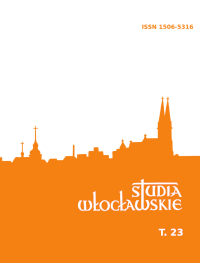Ecological issues in selected papal documents after the Second Vatican Council
DOI:
https://doi.org/10.52404/ttnwloc.stwl.23.16Keywords:
ecological issues, Vatican Council II, post-conciliar papal documentsAbstract
There may be different meanings in the word ecology. Ecology means the study of the structure and functioning of nature at different levels of organization. On the other hand, the identification of ecology with environmental protection has led to the emergence of deep ecology. In radical terms, deep ecology recognizes the Earth as a superior value, which leads is the principle of natural-centrism, in contrast to the anthropocentric views that recognize man as the highest value.
The Second Vatican Council in its Constitution Gaudium et spes emphasizes two fundamental issues of science, namely man and the world. The human person is at the center of the Church’s teaching. The unique position of a human being results from his personal dignity.
The social issues suggested by the Council Fathers found their deepening in the teaching of the post-Vatican II popes. Ecological issues in which man occupies a central place found its place in papal teaching even before the end of Vatican II, in particular in the encyclicals of John XXIII. His successors in the See of Peter repeatedly raised social issues in their teaching. Pope Francis’ encyclical Laudato si’ is the first papal document devoted entirely to ecology and can be treated as a moral education, which includes the current social teaching of the Church. This is also confirmed by Pope Francis himself when he cites the social encyclicals of his predecessors starting with Rerum novarum Leo XIII and when he quotes state-ments about ecology contained in the documents of bishops’ conferences of vari-ous countries, thus emphasizing that the science of ecology belongs to the entire Catholic Church. The Laudato si’ encyclical, speaking of integral ecology, presents an anthropocentric view, recognizing man as the highest value.
Downloads
References
Andrzejewski R., Ekologia, www.encyklopedia.pwn.pl [30.04.2020].
Benedykt XVI, Encyklika Caritas in veritate, 7 VII 2009, Kraków 2009.
Franciszek, pap., Encyklika Laudato si’, 18 VI 2015, Kraków 2015.
Franciszek, pap., Orędzie na 53. Dzień Pokoju Pokój jako droga nadziei: dialog, pojednanie i nawrócenie ekologiczne, 1 I 2020, https://episkopat.pl/oredzie-ojca-swietego-franciszka-na-53-dzien-pokoju/ [30.04.2020].
Hordecki B., Nauczanie społeczne Benedykta XVI wobec współczesnych problemów globalnych, „Środkowoeuropejskie Studia Polityczne”, 2(2010), s. 81–92. https://doi.org/10.14746/ssp.2010.2.06.
Jan Paweł II, Encyklika Dives in misericordia, 30 XI 1980, Poznań 1990.
Jan Paweł II, Encyklika Laborem exercens, 14 IX 1981, Wrocław 1992.
Jan XXIII, Encyklika Mater et Magistra, 15 V 1961, https://opoka.org.pl/biblioteka/W/WP/jan_xxiii/encykliki/mater_magistra_15051961.html [10.05.2020].
Jan XXIII, Encyklika Pacem in terris, 11 IV 1963, https://opoka.org.pl/biblioteka/W/WP/jan_xxiii/encykliki/pacem_in_terris_11041963.html [10.05.2020].
Jan Paweł II, Encyklika Sollicitudo rei socialis, 30 XII 1987, w: Encykliki Ojca Świętego Jana Pawła II, t. 1, Kraków 1996, s. 321–376.
Jan Paweł II, Encyklika Centesimus annus, 1 V 1991, Włocławek 1991.
Kostorz J., Katechetyczne znacznie encykliki „Laudato si’”, „Studia Oecumenica”, 15(2015), s. 69–79. https://doi.org/10.25167/so.3302.
Kościół i nauka w obliczu ekologicznych wyzwań. Źródła, inspiracje i konteksty encykliki „Laudato si’”, red. J. Poznański, S. Jaromi, Kraków 2016.
Kowalczyk S., Idea sprawiedliwości społecznej w nauce Kościoła, „Łódzkie Studia Teologiczne”, 8(1999), s. 83–95.
Majka J., Geneza i charakterystyka Konstytucji „Gaudium et spes”, ZN KUL, 10(1967), z. 4(40), s. 33–42.
Paweł VI, Adhortacja apostolska Evangelii nuntiandi, 8 XII 1975; https://nowaewangelizacja.org/strefa-ewangelizacji/dokumenty-o-nowej-ewangelizacji/evangelii-nuntiandi/ [10.05.2020].
Paweł VI, Encyklika Populorum progressio, 26 III 1967, https://opoka.org.pl/biblioteka/W/WP/pawel_vi/encykliki/populorum_progressio_26031967.html [10.05.2020].
Sobór Watykański II, Konstytucja duszpasterska o Kościele w świecie współczesnym Gaudium et spes, 7 XII 1965, w: Sobór Watykański II, Konstytucje. Dekrety. Deklaracje, Poznań 2002, s. 526–606.
Szulist J., Recepcja Konstytucji duszpasterskiej o Kościele w świecie współczesnym w encyklikach społecznych bł. Jana Pawła II, „Studia Gdańskie”, 30(2012), s. 99–116.
Szulist J., Zasada prawdy w nauczaniu społecznym Benedykta XVI, „Studia Gdańskie”, 42(2018), s. 133–144.





